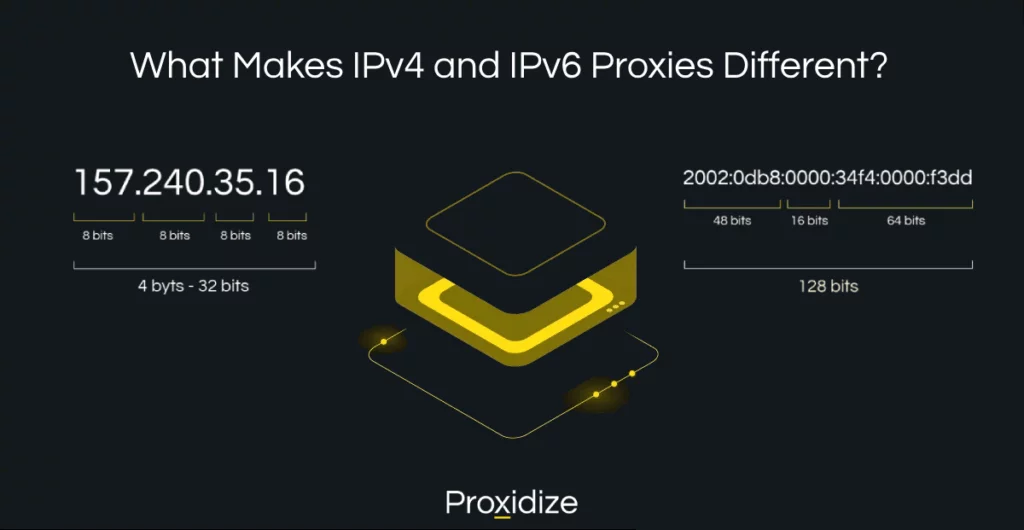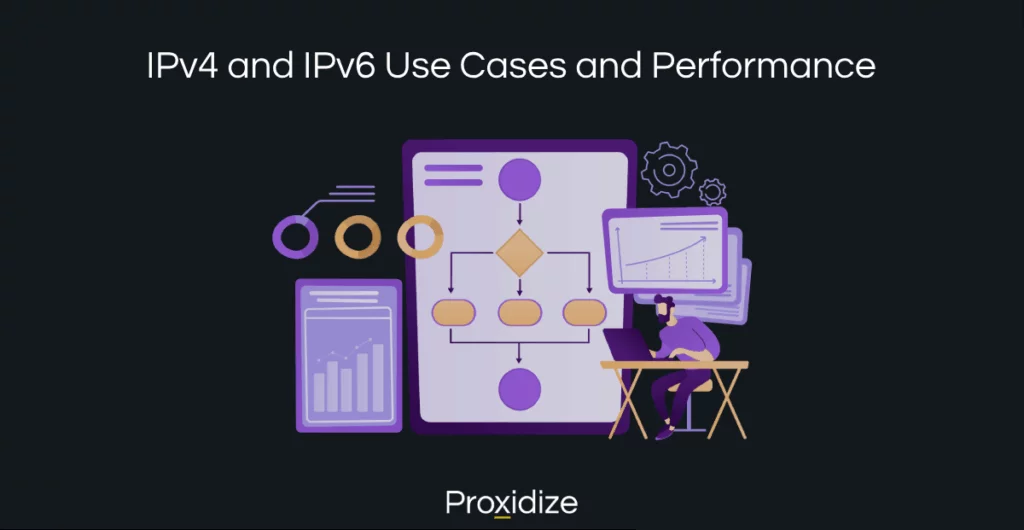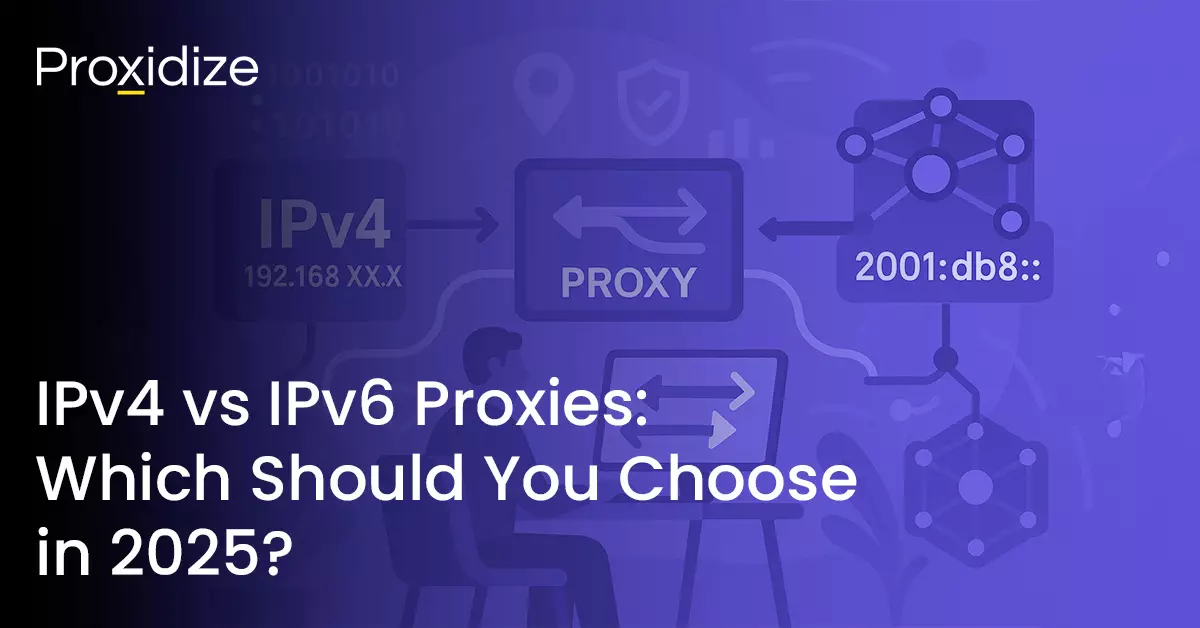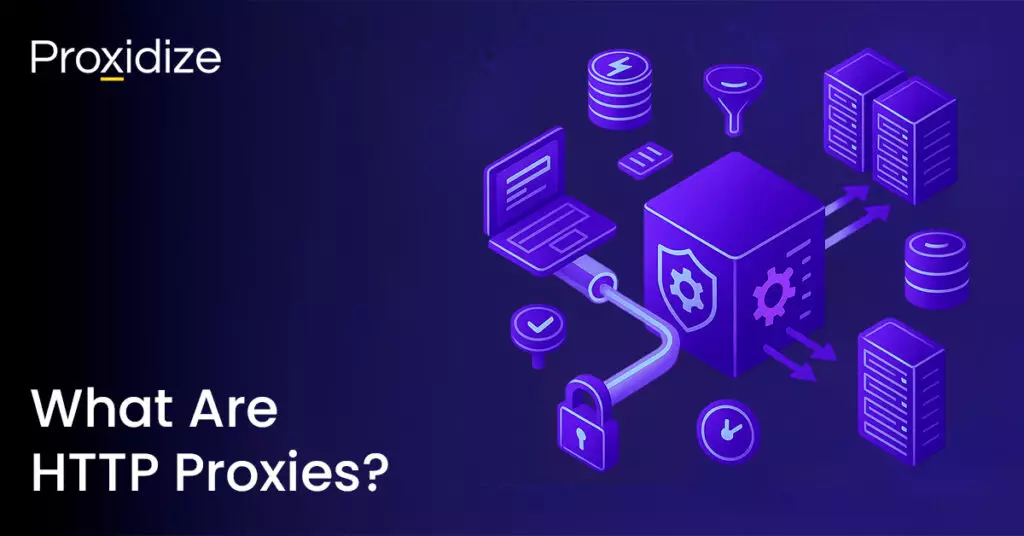As we reach the middle of 2025 and IPv6 adoption increases, we thought we’d revisit the discussion of whether it’s better to choose IPv4 vs IPv6 proxies. For some context, the US ran out of IPv4 addresses in 2015, yet IPv4 still routes most of today’s internet traffic.
IPv4’s 32-bit address length limits it to roughly 4 billion unique addresses. IPv6 came along in 1998 with a 128-bit address format that gives us about 3.4×10^38 possible addresses — practically unlimited. While there are differences between IPv4 and IPv6, they are mostly irrelevant to a proxy user. There are only a few instances where the subtleties have any bearing, which we’ll discuss.
IP address requirements keep growing fast. The US alone has over 1.5 billion addresses assigned. This means that there is a tradeoff to be made at a global level between continuing to find creative ways to recycle IPv4 or commit to IPv6. Adoption is increasing, though, reaching a peak of 48.83% at the end of April.
In this article we’ll discuss the difference between IPv4 vs IPv6 and explain what relevance they have for proxy users in 2025.

What Makes IPv4 and IPv6 Proxies Different?
The most basic differences between IPv4 and IPv6 are the length and format of their addresses. At the technical level, they have some differences in their protocol features at the architectural level, which has some bearing on their proxies.
IPv4: 32-Bit Address Scheme and Limitations
IPv4 proxies use the fourth version of Internet Protocol with a 32-bit addressing system. This system creates approximately 4.3 billion unique addresses (2^32) shown in dotted decimal notation (like 192.168.1.1). Each address has four octets separated by dots, and each octet can have values from 0 to 255. IPv4 has been the main protocol since 1983, but its limited address space has become a big problem.
Through things like network access translation (NAT), IPv4 exhaustion has been mitigated, allowing private IPs within a network to be non-unique, with each network only having one public IP address. While NAT has reduced the urgency of transitioning to IPv6, it also complicates a whole range of activities like connecting to a device with SSH.
The IPv4 headers contain many fields such as version, header length, type of service, total length, and header checksum. These fields need processing time and can slow down routing.
IPV6: 128-Bit Address Space and Future-Proofing
IPv6 proxies use a substantially bigger 128-bit address space that gives approximately 340 undecillion (3.4×10^38) unique addresses. These addresses show up in hexadecimal format (like 2001:0db8:85a3:0000:8a2e:0370:7334) and usually appear as eight groups of four hexadecimal digits with colons between them.
As a result, IPv6 has an almost endless supply of unique IP addresses, which would make things like NAT unnecessary — every device could have its own unique IP. This is how it used to work up until the early 90s, for example. IPv6 also has a simpler header structure with fewer fields than IPv4. It doesn’t have a checksum field, which makes packet processing faster.
Pros and Cons of IPv4 vs IPv6 Proxies
Pros of IPv4
IPv4 proxies continue to be the ubiquitous proxy available, which makes it the most practical choice for many reasons:
- Compatibility: IPv4 is widely supported by virtually every website, API, and online service. Users rarely face compatibility issues or service limitations with IPv4 proxies.
- Geolocation Accuracy: IPv4 geolocation data is well-established and precise, making IPv4 proxies highly reliable for tasks that depend on accurate country or city-level targeting, such as ad verification or location-specific web scraping.
- Stable Performance: The IPv4 infrastructure is mature, stable, and extensively tested, providing consistent performance and minimal latency issues.
- Less Scrutiny: Due to their prevalence, IPv4 proxies blend seamlessly into normal internet traffic patterns, reducing the likelihood of triggering anti-bot or anti-abuse mechanisms.
Cons of IPv4
IPv4 proxies have very few disadvantages other than having to account for NAT in some specific instances. Their address scarcity isn’t something that impacts proxy users directly, as the entire internet is geared to solve this problem.
An often-cited problem is reuse of IPs, which can lead to blocks and bans for the activity of a previous user. This is a far more acute problem due to shared proxies rather than something that is due to IPv4 itself.
Pros of IPv6
IPv6 proxies have their own set of benefits:
- IP Abundance: IPv6 addresses are abundant and, in theory, more cost-effective to procure, allowing proxy providers.
- Future-Proofing: IPv6 proxies align with the long-term direction of internet infrastructure, providing ongoing compatibility as more services adopt IPv6 support.
Additionally, IPv6 isn’t affected by NAT which means communication with servers can be significantly easier.
Cons of IPv6
There’s only a few nuanced cons to IPv6, which will continue to be resolved as rates of adoption continue to increase. These include:
- Compatibility Issues: IPv6 is not universally supported. Certain websites, particularly older or legacy platforms, APIs, or niche services, may restrict or entirely lack IPv6 support. Some countries or ISPs may not have IPv6 support either.
- Potentially Increased Scrutiny: IPv6 traffic patterns may occasionally trigger heightened scrutiny from anti-bot detection systems due to their relative rarity compared to IPv4 traffic. This is only really relevant when rotating through them quickly, e.g. rotating every request.
Less Granular Geolocation: While accurate at the country level, IPv6 geolocation data can be less accurate at city-level targeting. This is only an issue if granular geotargeting is relevant to your use case.

IPv4 and IPv6 Use Cases and Performance
You can choose the right protocol by understanding how IPv4 and IPv6 proxies work in specific situations. Based on a few nuances and differences, there are some situations in which one is clearly a better choice than the other.
IPv4 Proxies for Web Scraping
IPv4 proxies are better suited to activities like web scraping, because only about 40% of the top 1,000 domains have IPv6 support. IPv4 proxies connect better when collecting data from mainstream websites. Sites like Amazon, Twitter, GitHub, and WordPress all currently lack IPv6 support.
Speed and Latency
Tests in different locations showed that IPv4 and IPv6 have similar speeds for basic connections, with almost the same round-trip times. But IPv6 works better in multicast situations because it has simpler packet headers and better routing protocols like OSPFv3.
Security Features: IPsec and Authentication Headers
IPv6 is no more or less secure than IPv4 despite built-in IPsec. The Authentication Header (AH) protocol in IPv6 keeps data safe by using an Integrity Check Value (ICV) for the packet payload.
IPv6’s tunnel mode Authentication Headers protect better by wrapping the whole original packet with security gateway addressing. Both protocols can use IPsec, but IPv6 blends these security features naturally through its extension header design. The Encapsulating Security Payload (ESP) in IPv6 adds privacy through encryption, which standard IPv4 doesn’t have.
Choosing IPv4 or IPv6 in 2025
At the end of the day, your choice between IPv4 vs IPv6 comes down to whether or not you have a use that only an IPv6 proxy can provide. In almost all other cases you’re better of using an IPv4 proxy.
Device and ISP Compatibility
Your devices, ISP, and chosen proxy protocol must work together smoothly. Most modern operating systems now support dual-stack implementation, though Windows, macOS, and mobile platforms handle IPv6 differently.
You should verify your devices and ISP’s IPv6 protocol support before investing in IPv6 proxies. Google’s statistics show that IPv6 usage is set to cross 50% in 2025, but there’s notable differences across countries and providers.
Future Trends in IPv6 Adoption
IPv6 adoption keeps growing faster, and global user traffic should pass 50% in 2025. France (85%), Germany (76%), and India (74%) already show high IPv6 usage, while the United States hit 53%, according to Google. Several governments have mandated IPv6 deployment, which means that that IPv6 proxies will slowly become the standard as time passes.
IPv4 vs IPv6 Proxies Comparison Table
| Feature | IPv4 Proxies | IPv6 Proxies |
|---|---|---|
| Address Format | 32-bit addresses (e.g., 192.168.1.1) | 128-bit addresses (e.g., 2001:0db8:85a3:0000:8a2e:0370:7334) |
| Available Address Space | ~4.3 billion unique addresses | ~340 undecillion (3.4×10^38) addresses |
| Compatibility | Works with almost all websites and services | Limited support |
| Security Features | Optional IPsec setup | Native IPsec and authentication headers |
| Header Structure | Complex with multiple fields | Basic header structure without checksum field |
| NAT Requirement | Needs NAT to share addresses | Direct routing without NAT |
| Best Use Cases | – Web scraping- Legacy systems- Mainstream websites | – Gaming- Streaming services- Mobile applications |
| Current Adoption | Handles over 90% of internet traffic | ~50% global adoption expected in 2025 |
| Performance | Common hardware-accelerated routing | Enhanced multicast speed, latency similar to IPv4 |
| Configuration | Easy setup and control | Requires advanced configuration |
| Memory Usage | Efficient memory use | Needs more memory due to larger addresses |
Conclusion
IPv6 adoption is steadily rising, with it expected to surpass 50% this year. The internet is slowly transitioning itself to support IPv6, but for the individual proxy user, this is still largely irrelevant. The decision between using IPv4 or IPv6 proxies isn’t critical, nor does the global context of IPv4 exhaustion meaningfully impact your day-to-day proxy usage.
When it comes down to practical proxy use, you may find that some differences between IPv4 and IPv6 are relevant to your specific use case. IPv4 proxies continue to offer broad compatibility, established geolocation accuracy, and stable performance. IPv6 proxies, on the other hand, provide slightly lower latency and eliminate certain complexities associated with NAT, but come with occasional compatibility hurdles and slightly less precise geolocation data.
Key Takeaways:
- IPv6 adoption is increasing globally, but this does not practically impact individual proxy users.
- IPv4 proxies remain highly compatible and reliable, especially for mainstream websites.
- IPv6 proxies offer virtually unlimited addresses but occasionally suffer from compatibility issues with older services.
- The practical differences between IPv4 and IPv6 proxies are minimal; choose IPv6 only if your specific use-case requires its unique characteristics.
- Regardless of global IP address trends, the choice of proxy type remains a minor consideration for most users.
Choosing an IPv6 proxy only makes sense if you need features unique to IPv6. In most scenarios, either type will fulfill your needs without significant advantages or disadvantages.




